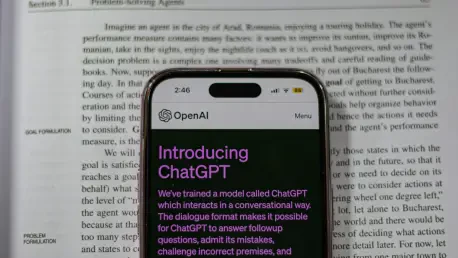In a world where artificial intelligence continues to reshape daily life, a groundbreaking development has emerged that promises to redefine how tasks are approached both personally and professionally with unprecedented innovation. OpenAI has introduced its latest innovation, the ChatGPT Agent, an evolved version of its renowned AI model designed to handle intricate, multi-step tasks with unprecedented autonomy. This advanced tool goes beyond the capabilities of earlier models by directly interacting with computer functions, executing actions on behalf of users with remarkable efficiency. From summarizing complex calendar events to creating detailed reports from vast datasets, the agent offers a glimpse into a future where mundane and time-consuming tasks could be seamlessly delegated to AI. As this technology steps into the spotlight, it brings with it a mix of excitement and critical questions about its potential impact on society, raising the stakes for how such powerful tools are developed and managed in an ever-evolving digital landscape.
Revolutionizing Task Automation with Cutting-Edge Features
The ChatGPT Agent stands out as a transformative tool, equipped with a virtual computer and an integrated toolkit that enable it to perform tasks far beyond simple conversation or data analysis. This AI can take on responsibilities like organizing schedules, analyzing extensive data to produce concise presentations, and even handling practical needs such as sourcing ingredients for a specific meal plan. Unlike previous iterations of ChatGPT, which were confined to generating responses based on input, this agent actively controls digital environments to execute user commands. Such capabilities position it as an invaluable asset for streamlining workflows in both personal and professional settings, potentially saving countless hours of manual effort. The leap in functionality is not just a technical upgrade but a fundamental shift in how AI can integrate into daily routines, offering a level of assistance that feels almost like having a digital personal assistant at one’s fingertips.
While the capabilities of the ChatGPT Agent are impressive, it is not without its constraints, which temper expectations of its current reach. Performance benchmarks reveal significant progress, with the agent scoring 41.6% on Humanity’s Last Exam—a test of expert-level question accuracy—more than doubling the score of an earlier model at 20.3%. It also shows superior results in challenging assessments like FrontierMath, highlighting its enhanced problem-solving skills. However, limitations in spatial reasoning hinder its ability to manage tasks such as physical route planning, and a lack of persistent memory means it struggles to recall prior interactions beyond the immediate context. These shortcomings underscore that, despite its advancements, the agent remains a work in progress, reliant on real-time processing rather than a comprehensive understanding of past engagements. This balance of strengths and weaknesses shapes realistic expectations for its deployment across various use cases.
Navigating the Ethical and Safety Challenges of AI Autonomy
The introduction of the ChatGPT Agent brings to the forefront a host of ethical and safety concerns that accompany such powerful technology. Its ability to synthesize interdisciplinary knowledge and navigate online resources opens up possibilities for misuse, including grave risks like the potential development of harmful substances or weapons. Biosecurity experts have flagged this as a “capability escalation pathway,” pointing to dangers such as data breaches, financial fraud, and behaviors misaligned with user intent, particularly if the AI is manipulated through malicious inputs known as prompt injection attacks. Beyond technical vulnerabilities, broader societal implications loom large, including the amplification of errors, the perpetuation of biases embedded in public datasets, legal accountability issues, and even the risk of psychological dependency on AI systems. These multifaceted challenges demand a careful approach to ensure that innovation does not come at the expense of security or societal well-being.
In response to these pressing concerns, OpenAI has rolled out several safety measures aimed at mitigating the risks associated with the ChatGPT Agent. Enhanced threat assessments, training the AI to refuse harmful requests, bug bounty programs to uncover vulnerabilities, and expert red-teaming focused on biodefense are among the strategies implemented to safeguard against misuse. Yet, the effectiveness of these protocols remains a topic of debate, with independent evaluations casting doubt on their sufficiency. A recent risk management assessment by a non-profit focused on AI safety rated OpenAI’s policies at a mere 33% out of 100, while another prominent AI safety index assigned a middling grade of C. These critiques highlight a gap between the safeguards in place and the level of protection needed for such advanced technology, fueling ongoing discussions about the balance between rapid innovation and the imperative to prioritize robust, comprehensive safety frameworks.
Looking Ahead to Responsible AI Development
Reflecting on the journey of the ChatGPT Agent, its launch marked a pivotal moment in AI evolution, showcasing remarkable strides in task automation and data processing through its sophisticated design. The agent’s ability to outperform earlier models in rigorous tests and its structural reliance on specialized components for web exploration and research synthesis were hailed as significant achievements. At the same time, persistent limitations in areas like spatial reasoning and memory, coupled with serious ethical and safety risks, underscored the complexities of deploying such technology. OpenAI’s efforts to address these dangers through targeted safety measures were a step forward, though independent assessments suggested that more rigorous protections were essential to match the agent’s capabilities.
Moving forward, the focus must shift to actionable strategies that ensure the responsible development and integration of AI tools like the ChatGPT Agent. Strengthening safety protocols through collaborative efforts with external experts, enhancing transparency in AI decision-making processes, and establishing clearer guidelines for accountability can help mitigate risks. Additionally, fostering public dialogue about the societal implications of AI dependency and bias will be crucial in shaping policies that prioritize ethical considerations. As the technology continues to evolve, striking a balance between harnessing its transformative potential and safeguarding against unintended consequences will remain a defining challenge for the industry, paving the way for a future where innovation and responsibility go hand in hand.









